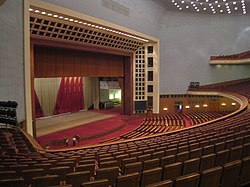| National People's Congress | |||||||
|---|---|---|---|---|---|---|---|
| Chinese name | |||||||
| Simplified Chinese | 全国人民代表大会 | ||||||
| Traditional Chinese | 全國人民代表大會 | ||||||
| Literal meaning | Nationwide People Representative Assembly | ||||||
| |||||||
| Abbreviation | |||||||
| Simplified Chinese | 全国人大 | ||||||
| Traditional Chinese | 全國人大 | ||||||
| |||||||
| Tibetan name | |||||||
| Tibetan | རྒྱལ་ཡོངས་མི་དམངས་འཐུས་མི་ཚོགས་ཆེན་ | ||||||
| |||||||
| Zhuang name | |||||||
| Zhuang | Daengx Guek Yinzminz Daibyauj Daihhoih | ||||||
| Korean name | |||||||
| Hangul | 전국인민대표대회 | ||||||
| Mongolian name | |||||||
| Mongolian Cyrillic | Бөх улсын ардын төлөөлөгчдийн их хурал | ||||||
| Mongolian script | ᠪᠦᠬᠦ ᠤᠯᠤᠰ ᠤᠨ ᠠᠷᠠᠳ ᠤᠨ ᠲᠦᠯᠤᠭᠡᠯᠡᠭᠴᠢᠳ ᠤᠨ ᠶᠡᠭᠡ ᠬᠤᠷᠠᠯ | ||||||
| Uyghur name | |||||||
| Uyghur | مەملىكەتلىك خەلق قۇرۇلتىيى | ||||||
| |||||||
| Kazakh name | |||||||
| Kazakh | مەملەكەتتىك حالىق قۇرىلتايى | ||||||
| Yi name | |||||||
| Yi | ꇩꏤꑭꊂꏓꂱꁧꎁꃀꀉꒉ | ||||||
 |
|---|
|
|
The National People's Congress (NPC) is the highest organ of state power of the People's Republic of China. The NPC is the only branch of government in China, and per the principle of unified power, all state organs from the State Council to the Supreme People's Court (SPC) are subservient to it. With 2,977 members in 2023, it is the largest legislative body in the world. The NPC is elected for a term of five years. It holds annual sessions every spring, usually lasting from 10 to 14 days, in the Great Hall of the People on the west side of Tiananmen Square in Beijing.
Since Chinese politics functions within a communist state framework based on the system of people's congress, the NPC works under the leadership of the Chinese Communist Party. Some observers characterize the branch as a rubber stamp body.[note 1] Most delegates to the NPC are officially elected by local people's congresses at the provincial level; local legislatures which are indirectly elected at all levels except the county-level. The CCP controls the nomination and election processes at every level in the people's congress system.
The National People's Congress meets in full session for roughly two weeks each year and votes on important pieces of legislation and personnel assignments, among other things. These sessions are usually timed to occur with the meetings of the National Committee of the Chinese People's Political Consultative Conference (CPPCC), a consultative body whose members represent various social groups. As the NPC and the CPPCC are the main deliberative bodies of China, they are often referred to as the Two Sessions (Lianghui). According to the NPC, its annual meetings provide an opportunity for the officers of state to review past policies and to present future plans to the nation. Due to the temporary nature of the plenary sessions, most of NPC's power is delegated to the Standing Committee of the National People's Congress (NPCSC), which consists of about 170 legislators and meets in continuous bi-monthly sessions, when its parent NPC is not in session.
Membership to the congress is part-time in nature and carries no pay. Delegates to the National People's Congress are allowed to hold seats in other bodies of government simultaneously and the party and the NPC typically includes all of the senior officials in Chinese politics. However, membership of the Standing Committee is often full-time and carries a salary, and Standing Committee members are not allowed to simultaneously hold positions in executive, judicial, prosecutorial or supervisory posts. Under China's Constitution, the NPC is structured as a unicameral legislature, with the power to amend the Constitution, legislate and oversee the operations of the government, and elect the major officers of the National Supervisory Commission, the Supreme People's Court, the Supreme People's Procuratorate, the Central Military Commission, and the state.
- ^ a b National People's Congress of the PRC. 中华人民共和国全国人民代表大会和地方各级人民代表大会选举法 [Election Law of the National People's Congress and Local People's Congress of the People 's Republic of China]. www.npc.gov.cn (in Chinese (China)). Archived from the original on 13 June 2017. Retrieved 18 June 2017.
- ^ a b "Electoral Law of the National People's Congress and Local People's Congresses of the People's Republic of China". National People's Congress. 29 August 2015. Archived from the original on 16 September 2021. Retrieved 12 July 2021.
- ^ a b "China's Electoral System". State Council of the People's Republic of China. 25 August 2014. Archived from the original on 4 September 2021. Retrieved 12 July 2021.
- ^ a b "IX. The Election System". China.org.cn. China Internet Information Center. Archived from the original on 6 March 2021. Retrieved 12 July 2021.
- ^ "What makes a rubber stamp?". The Economist. 5 March 2012. ISSN 0013-0613. Archived from the original on 8 November 2023. Retrieved 4 March 2024.
- ^ "China scraps premier's annual news conference a day before rubber-stamp parliament opens in Beijing". The Globe and Mail. 4 March 2024. Archived from the original on 4 March 2024. Retrieved 4 March 2024.
- ^ "China's rubber-stamp parliament at a glance". France 24. 5 March 2019. Archived from the original on 28 February 2024. Retrieved 4 March 2024.
- ^ "Two sessions: Can a rubberstamp parliament help China's economy?". BBC News. 4 March 2024. Archived from the original on 4 March 2024. Retrieved 4 March 2024.
- ^ Truex, Rory (28 April 2014). "The Returns to Office in a "Rubber Stamp" Parliament". American Political Science Review. 108 (2): 235–251. doi:10.1017/S0003055414000112. ISSN 0003-0554. JSTOR 43654370. S2CID 203545462.
Cite error: There are <ref group=note> tags on this page, but the references will not show without a {{reflist|group=note}} template (see the help page).



